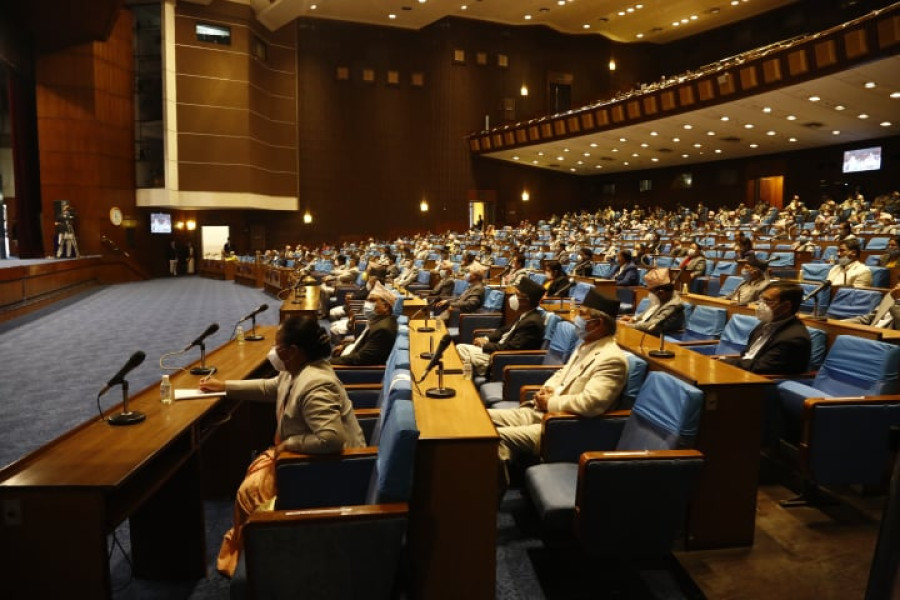National
Despite controversy, projects under MCC included in annual list of programmes
Ruling party lawmaker Bhim Rawal, who has been advocating against the compact in its current form, demands the leaders first discuss a report prepared by the task force.
Prithvi Man Shrestha
Despite opposition from within the ruling Nepal Communist Party, the government has included two projects listed under the controversial Millennium Challenge Corporation Compact between the US and Nepal, for implementation in the new fiscal year.
The government policy and programmes speech, presented before Parliament by President Bidya Devi Bhandari on Friday, stated that two 400KV transmission line projects— Lapsiphedi-Ratmate-Hetauda and Lapsiphedi-Ratmate-Damauli would be built in 2020-21. Besides these two transmission line projects, the MCC also aims to support road infrastructure under its proposed $500 million grant.
“The inclusion of the projects in next fiscal year’s policies and programmes shows that the Nepal government is committed to implementing them,” said Khadga Bahadur Bisht, member-secretary at the Millennium Challenge Account, Nepal, a special purpose vehicle formed to implement the MCC Compact “This also conveys a good message to the international community about Nepal’s policy continuity,” he said.
The government, however, stopped short of mentioning that these power line projects would be built with funding from the Millenium Challenge Corporation (MCC) Compact Programme .
However, it will not be easy for the government to forge an agreement within the ruling party to get Parliament to ratify the deal signed in September 2017.
Bhim Rawal, a member of the Jhala Nath Khanal-led task force that preparead a report on the MCC for the ruling party recently, criticised the government for incorporating MCC projects in its policies and programmes “through the backdoor”.
He said that the task force’s report should have been discussed in the party before any decision was taken on the issue. “If the MCC deal is in the interest of Nepal, the prime minister and the government should get an endorsement from the party to implement it,” said Rawal, who has been a staunch opponent of the deal. “Incorporating the projects under the MCC through the backdoor is against the institutional system of the party,” he told the Post.
Although the government had wanted to get the MCC Compact to be ratified by Parliament during its previous session, it could not be done due to opposition from within the party, especially from co-chair Pushpa Kamal Dahal and his allies. The deal has become a contentious issue as some leaders argue that it is part of the US Indo-Pacific Strategy, which has military components that are aimed at countering China, a friendly neighbour.
Those against the deal are opposed to the compact’s requirement that Parliament ratify the terms of the deal, which are to prevail over domestic laws in case they contradict with each other.
Another section of the ruling party, led by Prime Minister KP Sharma Oli, has lobbied in favour of the compact. The main opposition, the Nepali Congress, too is in favour of the deal.
To settle the dispute within the ruling party, leaders formed a task force under its senior leader Jhala Nath Khanal. The task force suggested that the MCC Compact be accepted only after revising some of its terms, such as the requirement that “Nepal accept laws introduced by the US in the future”, and that “terms of the deal prevail over domestic laws in case they contradict with each other.”
Finance Minister Yubaraj Khatiwada, in July last year, had registered the compact at the federal parliament for ratification. However, it was never presented before the House.
Bisht said that the projects could go ahead if Parliament ratified the compact during the current session as implementation of the projects under it could be pushed back due to the Covid-19 pandemic
Bisht said that his office has already prepared a tender document and is ready to issue it once the MCC Compact is ratified by Parliament. A report on environment impact assessment has also been submitted to the Department of Electricity Development for approval and the procedure to acquire land for a substation in Ratmate, Nuwakot has also been started, according to the Millennium Challenge Account Nepal.
Bisht said that the completion of these transmission line projects would not only help Nepal boost its supply system, but also export excess power to India as the lines could be charged with up to 3400MW power.
Meanwhile, the Millennium Challenge Account, Nepal and the Department of Roads are also discussing the upgrading a section of the East-West Highway with funds from the MCC Compact.
Shivahari Sapkota, spokesperson for the Department of Roads, said discussions are on to upgrade the 100km section from Dhankhola to Shivakhola near Bhaluwang, Dang by mobilising MCC aid.




 16.12°C Kathmandu
16.12°C Kathmandu















